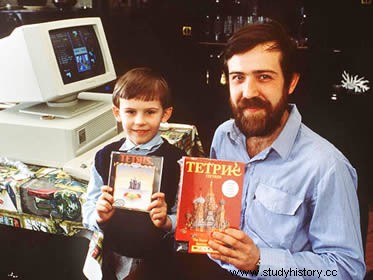
By Rainer Sousa
When talking about the Cold War, many of us ended up radicalizing the idea that there was a complete radicalization between the socialist and capitalist blocs. However, we can see that the construction of this dual world was contaminated by some gaps that break this rigid view of such a historical period. And for that, we go to the famous tetris game to contemplate one of these peculiar situations.
Considered a true classic of video games, tetris was the result of the efforts of a Russian mathematician named Alexey Pajintov. In mid-1984, this scholar took great interest in studying the pentominoes developed, thirty years earlier, by the American mathematician Solomon Golomb. In short, the pentominoes would be pieces formed by five squares that could support twelve different forms of arrangement.
Through this game, exercises could be done that employed different principles of logical and mathematical reasoning. Expanding its applicability in the academic environment, the creation of Golomb was of great contribution to the development of significant discoveries in the field of combinatorics. However, instead of looking for something more complex with the game, mathematician Alexey Pajintov decided to simplify the scheme by working with pieces formed by four squares.
From that moment, the popular game “tetris” was being created, which takes its name precisely because of the number of squares that shape the shape of the pieces. Already at this time, the Soviets turned the discovery into a fun board game popular in various regions of the socialist bloc. Upon arriving in Bulgarian lands, the news fell into the hands of an English businessman named Robert Stein, who soon broke the barrier of the popular world and brought the game to the West.
In 1988, Tetris was the newest bet by the video game company Nintendo. In its first months, the Japanese market absorbed three million copies of the game. And that was just the beginning of other thunderous figures. Since the beginning of the mobile gaming market, it is estimated that tetris has been downloaded over 80 million times. And before that, thousands of Game Boy-branded handheld video games were consumed thanks to the same tempting little game.
Even with the astronomical values that prove its success, it was necessary for the Russian mathematician to wage his own “Cold War” to also enjoy the laurels and gains of his invention. After an extensive legal battle involving Japanese, Russian and American companies, mathematician Pajintov managed, in 1996, to win a slice of the profits generated by tetris.
